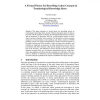1948 search results - page 8 / 390 » Formalizing Mirror Theory |
AI
2003
Springer
14 years 21 days ago
2003
Springer
This paper introduces a formal theory for describing actions in terminological knowledge bases, closely related to description logics. It deals in particular with the problem of ad...
LFCS
2009
Springer
14 years 1 days ago
2009
Springer
A bialgebra is a structure which is simultaneously an algebra and a coalgebra, such that the algebraic and coalgebraic parts are compatible. Bialgebras are usually studied over a ...
SIGCSE
1997
ACM
13 years 11 months ago
1997
ACM
We present a collection of new and enhanced tools for experimenting with concepts in formal languages and automata theory. New tools, written in Java, include JFLAP for creating a...
WSPI
2004
13 years 8 months ago
2004
Conceptual Modeling is a discipline of great relevance to several areas in Computer Science. In a series of papers [1,2,3] we have been using the General Ontological Language (GOL)...
IJAR
2006
13 years 7 months ago
2006
In spatial reasoning, in particular for applications in image understanding, structure recognition and computer vision, a lot of attention has to be paid to spatial relationships ...

